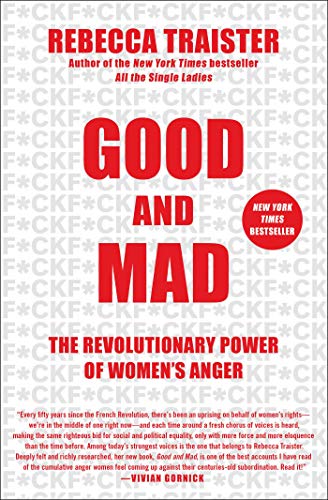Good and Mad: The Revolutionary Power of Women’s Anger

“Female rage is the essential fuel of #metoo.”
—Caitlin Flanagan
Women’s anger is all the rage at present. The #metoo movement unleashed a deluge of pent-up emotions that many women had repressed. Now, writing about women’s anger; where it comes from, how it is harnessed and, how it is being let loose, is a growth industry. As if women finally understand that their anger is righteous and irrepressible.
Rebecca Traister’s book is about the power of women’s anger. It is a historical look at women’s anger, the women who expressed it and those who paid the price for doing so. She writes of an anger that is “hot, bubbling, wholly out of control.” It is a challenge to social constructs.
All women have been told to be quiet, be calm, be collected, be “ladylike.” Those admonitions come whenever a woman or girl voices her objections, leading to a pent-up, repressed rage.
Women are the majority in the world but, according to Traister, “[I]n order to maintain minority rule, the majority’s resistance must be repressed, its anger discouraged.” There have been calls to repeal the 19th Amendment and, once again, deny women the right to vote.
Throughout history women have been forced to maintain a genteel existence and taught that the “little ladies” just need to be cared for by their father, brothers, boyfriends, and husbands.
Former Colorado Congresswoman Patricia Schroeder is one of the women that Traister covers. Schroeder was known for her wit and “cheery feminized persona.” When asked how she could be both mother and congresswoman, Schroeder’s famous response was, “I have a brain and a uterus, and I use both.” She later regretted the remark because, “I don’t think anyone likes a smart aleck.” According to Schroeder, “Women are supposed to put up with it, suck it up, and move on.” But Schroeder often quoted her father’s advice, “never frown at your enemies. Smile—it scares the hell out of them.”
The 2016 presidential election was a pivotal point for women’s anger. Hillary Clinton’s loss was a gut-punch to women who believed that the most qualified person ever to run for president was defeated by a misogynistic, man-child, boasting of his mistreatment of women.
The Women’s March in January 2017, the largest public demonstration ever held in Washington, D.C., reflected the anger of women around the world.
This is the world Rebecca Traister covers in her book. She writes of her own experience with Harvey Weinstein, the man who personifies the reasons for the #metoo movement. Watching Weinstein’s downfall in 2017 and the rise of #metoo gave Traister a release. “The anger window was open.”
Traister’s book is divided into four parts: Eruption, Medusas, Season of the Witch, and The Furies. Each one builds the momentum created by the others.
The anger that grew after Hillary’s defeat is flourishing as a record number of women seek political office. The thought of the majority becoming a majority of elected officials is frightening, when instead it should trigger a new enlightenment within the body politic.
In the 19th century women began to come together due to religious revivals and industrialization. Traister recounts the advances women made as they entered factories and schools as teacher and students. Women began to communicate with each other about the anger they experienced—“over the enslavement of African Americans, over their lack of a franchise, over the dangerous working conditions many of them faced.”
Those conversations resulted in the abolition, suffrage, labor, and temperance movements. Together, women are unstoppable and that’s why so much effort is put into stopping them. Once, again, women are coming together, sharing their experiences, frustration, rage and anger, and creating a new movement to empower women and girls.
Traister’s book provides a blueprint for women to follow in acknowledging the legitimacy of their anger. Following in the footsteps of women from Boudica to Elizabeth Cady Stanton to Schroeder to Flo Kennedy and Tarana Burke, women are in good company.
At the end of the book, Traister writes, “Being mad is correct; being mad is American; being mad can be joyful and productive and connective. Don’t ever let them talk you out of being mad again.”
Amen, sister!